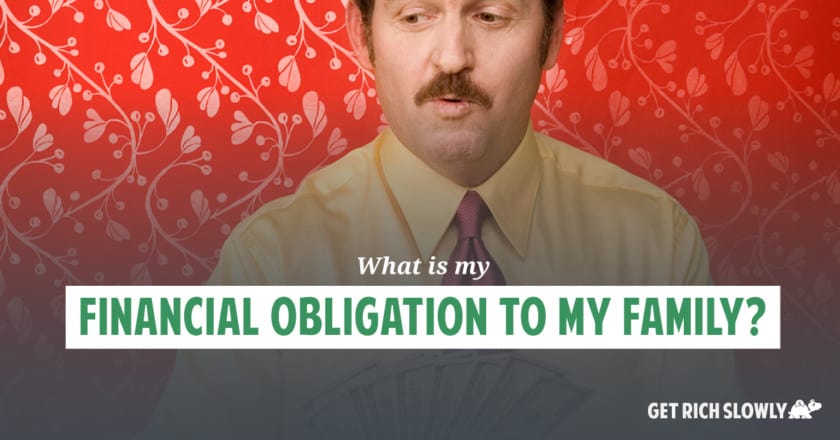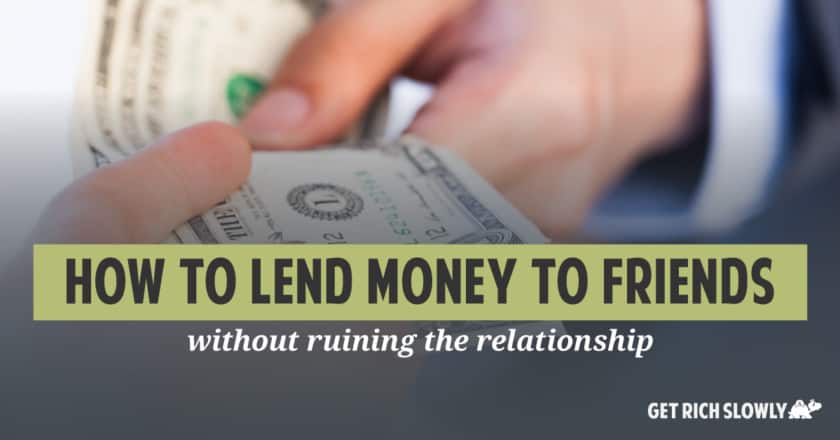10 financial lessons I learned from my parents’ divorce
This article written by Sydney is part of the “reader stories” feature at Get Rich Slowly. Sydney blogs about personal finance, entrepreneurship, self improvement, travel and lots of other fun stuff on Untemplater.com. Some reader stories contain general advice; others are examples of how a GRS reader achieved financial success or failure. These stories feature folks with all levels of financial maturity and income.
It's hard to believe it's been about 20 years since my parents first separated, and it's actually a blessing it happened when it did. No parent ever wants to put his or her child through the nastiness, heartache and sadness that comes with divorce, but having lived through my parents' split, I can tell you that it actually can be the best option.
When I was a kid, I didn't understand why my parents couldn't get along. Neither one of them was mean or evil; they didn't cheat on each other. They had jobs, loved me, supported my interests and activities, and they didn't seem that different from my friends' parents. Well, except for the arguing. It got really nasty toward the end of their marriage. There is absolutely nothing positive or healthy for a child of any age who has to live in a house with two yelling parents.
Student loan debt: How I got in deep
My mother was quadriplegic by the time I was in high school. My dad was a real estate agent who worked on commission, so he worked long hours to make ends meet. As a result, I took on a lot of responsibility at a young age.
I cooked and cleaned and did all the grocery shopping. I did the laundry and paid the bills (in the “balancing the checkbook and writing the checks” sense, not the earning money sense). I took my mother to the bathroom, fed her, and tracked her pill regimen. And most importantly, I believed that a college education was a good value.
I knew my parents couldn't afford to send me to college, and I wasn't allowed to have a job because of my responsibilities at home. So in lieu of saving for college, I threw myself into everything school had to offer.
Are universities immoral?
Yes, this is another article bemoaning the cost of a college degree, and the amount of student debt that many graduates take with them alongside their diplomas -- assuming they graduate, which doesn't always happen. (Paying off students loans without a college degree must be the epitome of rock-and-hard-place-ishness.)
You've read all the numbers about how the cost of college has risen far faster than the median household income, and how there's now more student loan debt than credit card debt. But besides the fact that debt stinks, graduating with a $30,000 I.O.U. (or more) has plenty of other harmful effects:
Student loans bring future consumption to the present. Debtors (often being paid entry-level salaries) have to devote a portion of their income to what they would otherwise be spending on cars, homes, kids, and iThingamajigs (well, they'll still buy those last things, but put it on the credit card, which is just more future consumption being spent now, with interest). This drains money from the overall economy, benefitting no one but the universities and the student-loan providers.
Surviving Student Loans
The student loan juggernaut, before it became a national scandal, was a way of life for many middle-class high school students like myself. Better known as a "necessary evil," than a reason to be embarrassed or worried.
But you can't change the past, so here is advice for students past and present — whether you're about to make the leap and want a glimpse of your future or you are still recovering from the fall.
Prep for Success
Student loans do not equal a free education, even if it seems like it at the time you sign on the dotted line. Put the math in terms you can accept: According to its 2012-2013 rates, one year at Princeton is like buying 109 iPads and paying for them for the next 30 years. Four years at Penn State is the same as buying a 1,867-year subscription to Forbes magazine. Talk about a legacy.
Continue reading...
Calibrating and Circumventing the Cost of College
It's a common refrain that today's college graduates are entering into the worst job market and economy since Hoover was around. We're told that an undergraduate degree means less than what a high school diploma once was, yet we're investing more in school than ever before. Post college debt is a major emotional weight on the backs of this newest generation, and colleges encourage debt with ease — don't worry about it; you don't have to pay it off until after you've graduated and have a well-paying job.
We're sold on it and it's a hard sell, not only by schools, but by the banks' ad dollars, as well. Previous generations didn't start life with so much debt, and in the middle of a job-killing recession no less. You probably aren't going to pay off that kind of debt waiting tables. Realize that college debt most likely means postponing life goals such as mortgage, car, marriage, and maybe even children.
Good-to-know facts about college debt
How big of a problem is the cost of college? Consider the following:
Continue reading...
How much do we owe others? (and when should we walk away?)
 Last January I loaned money to a friend who was in financial crisis: Her vehicle was about to be repossessed. The transaction troubled me for a number of reasons, which I detailed at my personal website in a post called “I'm not a payday lender. But I play one on TV.”
Last January I loaned money to a friend who was in financial crisis: Her vehicle was about to be repossessed. The transaction troubled me for a number of reasons, which I detailed at my personal website in a post called “I'm not a payday lender. But I play one on TV.”
During my trip to the East Coast I spent part of a weekend with “Monica” and her family. (Names have been changed to protect the profligate.)
When we made a Wawa* run, Monica didn't want me to pay for my own Tastykake.** She threw it in with her own order, which totaled a little more than $34 and which included a coffee cake, a box of doughnut holes, and a $2-plus bottle of iced tea.
What is my financial obligation to my family?

Last Friday's question about the moral implications of spending prompted a great discussion, as well as a few personal messages. One of those e-mails was from Dave, who wrote with his own ethical dilemma. Instead of looking at the world at large, Dave wants to know how to handle a financial dilemma closer to home: with his own family. Here's his story:
I read your site though I no longer need it. I did a lot of the things you talk about and was able to retire early because of it. The rest of my family hasn't been as smart or lucky. My sister is doing okay, I guess, but my brother is in a lot of trouble, and my parents aren't anywhere near ready for retirement.
My brother and his wife have two kids. They declared bankruptcy a couple of years ago and have tried to make a fresh start. Life has dealt them some bad blows, but they're doing nothing to protect themselves either. To be honest, I feel like they just set themselves up for trouble. After declaring bankruptcy, they just returned to their former lifestyle and now they're back in debt again.
How to lend money to friends (without ruining the relationship)

Lending money to friends and family is a generous act — one that could easily backfire and even ruin your relationship. Most of the time when someone is considering a loan to a family member, I think, "Don't do it." There can be other ways to help. But when it's someone you care about, logic only plays one role in the decision-making process.
Not too long ago I was in this situation. (I want to share it, but obviously I also want to be sensitive about revealing personal information, so I'm changing names and other minor details.)
I've been friends with Megan for almost 10 years. In that time, she's never had much money, but she also never asked for so much as $5. Last year, she and her boyfriend rented an apartment. A month later, he lost his job, and she had to go on medical leave. He couldn't find another job, and she had tried to return to work but her doctor wouldn't sign the medical release (it was still too early). To complicate things, they had a child. I knew my friend, and I knew she was only asking for help because of her child. They were behind on rent, and although she had just started back at work, she wouldn't see a paycheck for another two weeks. Continue reading...
When to walk away from a bad mortgage
Since the housing bubble burst, many Americans have found their finances underwater. They're paying on homes that are worth much less than the mortgages against them. More than a few have chosen to walk away from these debts.
Called a "walkaway" or a "strategic default", deliberately defaulting on your mortgage is becoming more common as the real-estate market continues to struggle. Some experts believe that as many as 20% of homes currently in foreclosure are the result of walkaways: people who had the means to pay their mortgage but chose not to when their life circumstances changed and they found their homes unsellable.
Businesses walk away from bad investments and debts like this all the time, but for an individual to do it takes guts. There's a huge stigma associated with walking out on your mortgage. Americans feel that there's something morally wrong with not paying your debts, even when those debts are astronomical or unfair.
Should we buy our dream house?
What happens when a great opportunity comes along, but you don't quite have the resources to take advantage of it? That's what Greg wants to know. He and his wife have found their Dream House. They think they can buy the place — but only if they're willing to take on some short-term debt in addition to the mortgage. Greg wants to know if this is a smart move. Here's his story:
My wife and I are in our late twenties, no kids (yet), both safely employed and living very comfortably with a combined monthly income of around $5,000 after taxes. We currently have about $28,000 in student loans, and plan to pay them all off within the year. The original amount was $37,000 six months ago, so we've been making quick progress with them. One loan is in deferment while my wife is in school, another requires $80 a month for the payments, and the one we are aggressively paying off has no monthly payment due until 2014 because of our extra payments. Basically, we only need $80 a month to satisfy our loans for the next two years. We have no car payments, credit card debt, or anything other than the student loans.
Everything was going as planned until two weeks ago we found a house we absolutely loved. We've checked it out, and aside from minor cosmetic things, its move-in ready. It's a foreclosure with an asking price around $136,000 (houses are cheap in the Houston area!). We'd plan to stay in the area a minimum of ten years, if not longer. Continue reading...
